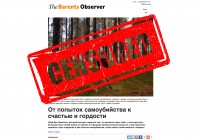
The Barents Observer is now blocked in Russia
ADVERTISEMENT
«Block this newspaper to hell,» says Vitaly Milonov. He is Member of the State Duma, Russia’s lower house of parliament, and known for his hardline stance on liberals and independent-minded groups.
In an interview with the Federal News Agency, Milonov lashes out against the small English- and Russian-language newspaper, saying that it represents «degeneration and decay» and that «its ideology and its clients is based on people with queer psyche.»
According to Milonov, who is also a member of the parliament’s Foreign Affairs Committee, the Barents Observer must not only be blocked in Russia. In addition, also diplomatic measures should be taken.
«We must send them a note of protest, call in the ambassador of Norway and say: what you are doing can affect our relations, if you continue to produce this kind of materials for Russians in the Russian language.»
Blocked in Russia
The plea from Milonov and his supporters has been met by Russian authorities.
From Tuesday morning, the Barents Observer has been unavailable to readers in Russia. Several sources in the country confirm that they can no longer access the site and preliminary data on website traffic indicate that the number of Russian readers already has shrunk significantly.
ADVERTISEMENT
Readers in Russia must now apply VPNs in order to access the newspaper. It can also be read with the mobile phone browser by Opera.
The story about Dan Eriksson
The blockage comes after Russia’s state media authority Roskomnadzor on 28th January issued a warning saying that the story about Dan Eriksson, a homosexual Sámi man from northern Sweden, is a violation of Russian law. In a letter, the media authority gave the Barents Observer 24 hours to remove the Russian-language article.
The story, originally published by Swedish newspaper Arjeplognytt, tells about Eriksson who lived through years of hardship, and twice tried to kill himself, because of taboo and prejudices connected with his sexuality. He is now a happy man who works with mental health issues among young Swedish gays.
Roskomnadzor argues that the story propagates suicide and is in conflict with Russian Federal Law «On Information, Information Technologies and Information Protection».
The Barents Observer has declined to comply with the demands and the story remains available on the website, both in an English and Russian version.
Storm of attention
The attack on the Barents Observer made headlines all over Scandinavia and leading Russian newspapers, among them Vedomosti, Novaya Gazeta, Interfax, Dozhd and MediaZona, reported on the case.
On the other end, several hardline Russian media resources soon engaged in a campaign aimed at undermining the newspaper. In the frontline of that campaign has been the Federal News Agency, a news resource associated with Yevgeny Prigozhin, the controversial Russian businessman believed to be a friend of President Vladimir Putin.
The Federal News Agency owns several more news resources, among them the Politika Segodnya, Ekonomia Segodnya and Narodnye Novosti, and also these resources published defaming stories about the Barents Observer.
In an interview with Politika Segodnya on 12 February, Aleksandr Malkevich, leader of Russia’s Public Chamber on information, media and mass communications, says «it is time to set an example» against the Barents Observer.
«We need one striking show of corporate punishment,» he underlines. «And if that will not be enough, then we will need to whip them two or three times,» he continues.
«We have to do it as tough as possible within the frames of our legislation, with the maximum level of demonstration and publicity.»
Interestingly, Malkevich is not only a representative of the Public Chamber, but also editor of news site USA Really, an initiative reportedly associated with that same Federal News Agency. In late December 2018, Malkevich was put on the US sanction list for attempts to interfere in elections.
According to RBC, the Federal News Agency and its subsidiaries all started up on the same address as the so-called Troll Factory in St.Petersburg. «From the Troll Factory has grown a Media Factory,» the RBC reported in 2017.
The owner of the news resource, Mr Prigozhin, is also believed to be associated with the so-called Wagner Group, the quasi-independent military group that has engaged in a series of dubious operations in international conflict areas.
Stepping up focus on Scandinavia
The blocking of the Barents Observer in Russia, as well as the slandering in media outlets, can be seen as a concerted effort by Roskomnadzor and the media resources of the Federal News Agency.
Part of that picture is Vitaly Milonov and other powerful representatives of the Russian establishment. In his interview with the Federal News Agency, Milonov makes clear that Scandinavia should be a priority for upcoming Russian media initiatives abroad.
«Russia must respond to the expansion of immorality and promote its ideology in the West,» the State Duma representative says.
«Here is no reason for hesitation, yes - we are present in certain countries, but this presence is insignificant. For us, it is important not only with the USA and the UK, but also other countries, among them Scandinavia where alternative voices are hard to hear.»
According to Milonov, state news agency Sputnik should now be given a stronger role in the Nordic region.
«Let them [Sputnik] unfold an information campaign and we must help them the best way we can.»
… We hope you like to read our articles.
For 15 years, the Barents Observer has provided serious, fact-based stories about life and developments in the North. Please help us to strengthen our independent journalism. Get engaged, give a small donation. Thank you
ADVERTISEMENT
The Barents Observer Newsletter
After confirming you're a real person, you can write your email below and we include you to the subscription list.





